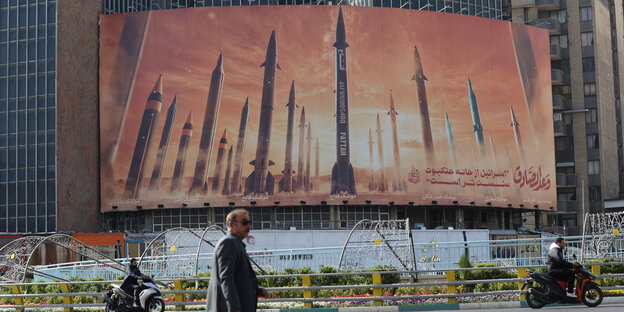Israel does not want to leave the major Iranian attack unanswered. It has not yet been decided what exactly the reaction will be.

Will the situation between Israel and Iran continue to worsen? Rockets ready on an advertising billboard in Tehran on April 15, 2024 Photo: Wana News Agency/Majid Asgaripour
TEL AVIV dpa | Israel wants to punish Iran for its drone and missile attacks without losing international support. Israeli Chief of Staff Herzi Halevi said on Monday that further measures were being considered. An attack with so many rockets against Israel will be followed by a reaction. At the same time, Halevi added: “Iran's attack has created new opportunities for cooperation in the Middle East. “We are evaluating the situation and are prepared at the highest level.”
According to a report by Israeli radio station Kan, Israeli Prime Minister Benjamin Netanyahu stressed in a meeting with ministers from his Likud party that the Iranian attack must be followed by an intelligent response. Iran should have to wait nervously to see when the counterreaction will occur, just as Israel did before Saturday night's attack.
The Israeli war cabinet met again on Monday. Initially there was no official statement about the results of the meeting. The Channel 12 television channel reported, without citing sources, that several scenarios had been discussed on how to respond to the major Iranian attack. Therefore, Israel's goal is to harm Iran without triggering an all-out war.
The US government declined to comment publicly on possible retaliation by Israel. “We will let the Israelis have the say,” National Security Council communications director John Kirby said Monday. The United States does not participate in the decision-making process.
Washington does not want to retaliate
Israel's army had received support from the United States, Britain, France and Jordan to successfully repel the Iranian attack. The United States also reaffirmed its “unwavering commitment” to Israel's security after the attack. However, Washington does not want to participate in a possible retaliation and, like other allies, is pushing for a reduction in tension. Asked whether the United States was concerned that an Israeli retaliation could endanger American forces in the region and therefore did not want to participate, Pentagon spokesman Pat Ryder said Monday that it was up to Israel to decide whether would respond to the attack. Or not.
Israel's Defense Minister analyzes new actions in Rafah
The Iranian attack showed how important Israel's relations are with the US and other partners, Das wrote Wall Street Journal on Monday. Analysts say this will likely be an important consideration as Israel – previously increasingly isolated due to its repression in the Gaza war – weighs its next step. War objectives in the fight against Iran's ally Hamas in the Gaza Strip are also likely to be part of Israel's calculations, including the planned offensive against the refugee-crowded city of Rafah in southern Gaza. closed coastal zone.
Israeli Defense Minister Joav Gallant discussed further actions in Rafah on Monday afternoon with representatives of his ministry and the Cogat authority, responsible for contacts with the Palestinians and humanitarian aid. According to the government press office, the meeting was mainly about evacuating civilians from the city and expanding the supply of food and medicine. Before Iran's major attack on Israel, Prime Minister Netanyahu announced that there was already a date for an offensive. However, Gallant contradicted him shortly thereafter.
The EU could impose new sanctions on Iran
Meanwhile, possible new sanctions against Iran are being considered in the EU. As several diplomats said on Monday afternoon after talks between representatives of the Member States in Brussels, the issue will probably come up on the table this Tuesday during a video conference between Foreign Ministers. New punitive measures could therefore be imposed through a sanctions regime that was established after Iran began supporting Russia's war of aggression against Ukraine through drone deliveries. Until now, among other things, it has banned the export to Iran of components used for the construction and production of drones. In addition, punitive measures also affect people and organizations.
However, according to diplomats, the risk of escalation could speak against tough new sanctions. EU foreign policy chief Josep Borrell wants to continue trying to persuade Iran to return to compliance with an agreement to restrict its nuclear program. His goal is to prevent Iran from building a nuclear bomb. Tuesday's video conference, called because of the Iranian attack on Israel, will fundamentally discuss how the European Union can contribute to de-escalation in the region.
Erdoğan talks to the Emir of Qatar about the war in Gaza
According to his office, Turkish President Recep Tayyip Erdoğan called the emir of Qatar and called for greater cooperation between Islamic countries in light of the Gaza war. They must intensify their efforts to stop Israel's “brutal attacks” in the Gaza Strip and hold the country accountable for “crimes against humanity,” the presidential office said in a statement on Monday. It is crucial to rein in Israel and act with common sense to prevent tensions from spreading in the region. The Iranian attack on Israel was not explicitly mentioned.
